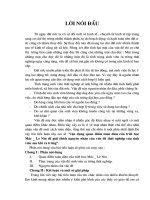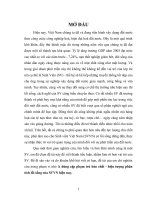who which that
Bạn đang xem bản rút gọn của tài liệu. Xem và tải ngay bản đầy đủ của tài liệu tại đây (18.99 KB, 1 trang )
<span class='text_page_counter'>(1)</span>RELATIVE PRONOUNS -show examples on the board: show some defintions in the dictionary. Artist – bee – bus – cheese -Circle the words: who, which, whom, that introduce they are relative pronouns ( đại từ chỉ quan hệ). Who, whom : chỉ người – người mà Which: chỉ vật – cái mà, thứ mà That: chỉ người và vật. We use relative pronouns to make the nouns more clearer/ tells more about nouns / sentences more complex and more meaningful/ join sentences have the same nouns. Grammar: The boy plays soccer. He is my best friend. The boy who is my best friend plays soccer. The book is thick. She already read it. The book which she already read is thick. I love this city. It is really beautiful. I love this city which is really beautiful. She met the manager. He was very angry. She met the manager who was very angry. “That” can replace “who, whom, which” Change all sentences above with “that”. The boy that is my best friend plays soccer. The book that she already read is thick. I love this city that is really beautiful. She met the manager that was very angry. When can leaving who, which, that? If “that, which, who” stands as object in relative clause leave it out. Or, we can say 2 subjects must have 2 verbs. The man I phoned spoke English. I phoned the man who/that spoke English. Prepositions in relative clauses: Some verbs have prepositions with them ( look at, live on, stay at…) Keep the prepositions with the verbs. The song was fantastic. I listened to it. The song which I listened to was fantastic. The blue house is on the left. I live in it The blue house which I live in is on the left. Where, whose, what,.
<span class='text_page_counter'>(2)</span>









